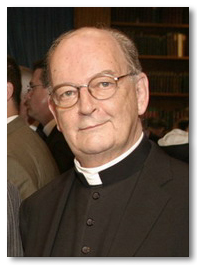Father Richard John Neuhaus
- FATHER RAYMOND J. DE SOUZA
The National Post is conducting a search to find Canada's most important "public intellectual." In today's installment, Father Raymond J. de Souza profiles Christian intellectual Father Richard John Neuhaus.
 |
Fr.
Richard John Neuhaus |
I first knew Father Richard John Neuhaus as a "beautiful mind" as our Post series puts it before I knew him as a beautiful soul. I count him now as a friend and mentor, but it was his published work that first drew me to him. As far back as 1988, U.S. News and World Report listed him among the 32 most influential intellectuals in America, and just this year Time ranked him among the 25 most influential Christian leaders as a key, but informal, advisor to President George W. Bush.
Fr. Neuhaus's reach extends from his Fifth Avenue office in New York, to the White House, to Pembroke, Ont., where he was born in 1936 and raised. He vacations in the Ottawa Valley every year for a month, where he celebrates Mass in the local parishes. But his interest in Canada extends beyond vacationing. He returns a few times each year to headline a conference or fundraiser, where he is always an A-list draw. (He could be back every month if he accepted all the invitations.) And through his editorship of First Things, the flagship intellectual journal of the social conservative movement, he keeps his influential American readers aware of what goes on in Canada.
Richard John Neuhaus is the son of a American Lutheran pastor who came north to "missionary territory as it was known in the 1930s. Neuhaus himself would go back south, following his father into the ministry, becoming a young pastor with a large black congregation in Brooklyn. Throughout the 1960s and early 1970s, he was a celebrated preacher and national activist in the "Movement," assuming a leadership role in the civil rights struggle and in protesting the Vietnam War. To this day, he counts his encounters with Martin Luther King, Jr., as one of the great blessings of his life.
Neuhaus broke with the civil rights movement of the 1960s when the left moved on from civil rights and peace activism to moral libertinism, particularly abortion rights and anti-anti-communism. He contended that both the Christian Gospel and the left's own tradition of defending the weak should place the Movement on the side of the unborn, and against communist totalitarians. He lost that argument on the left, and the left lost one of its leading lights.
The measure of Richard John Neuhaus's influence is found in one of the great cultural and political stories of the past generation the shift of religious believers from leftist parties (for economic welfare reasons) to rightist ones (for moral and cultural reasons, as well as national security concerns), a shift most evident in the United States, but also present elsewhere.
That shift is the work of thousands of activists, but only a few intellectual architects. Neuhaus stands in the first rank of those. It would be impossible to convene any meeting of social conservatives in North America in which the key participants were not influenced by Fr. Neuhaus.
| What is the role of religion in public life? It was his landmark book, The Naked Public Square, published in 1984, that challenged the secularist left's attempt to strip public life of all religious symbols and arguments. Whether it is the Ten Commandments or the Pledge of Allegiance, opponents of the secularist agenda apply Neuhaus's arguments. |
What is the role of religion in public life? It was his landmark book, The Naked Public Square, published in 1984, that challenged the secularist left's attempt to strip public life of all religious symbols and arguments. Whether it is the Ten Commandments or the Pledge of Allegiance, opponents of the secularist agenda apply Neuhaus's arguments. In 2001, when prime minister Jean Chretien banned all prayer from the 9/11 memorial on Parliament Hill later calling it the best decision of his political career his critics use the language of Neuhaus to attack him.
In 1996, Neuhaus's journal, First Things, launched a frontal assault on the "judicial usurpation of politics," the use of the U.S. courts to achieve secular goals such as abortion-on-demand and gay marriage, which could never be achieved in democratically elected legislatures. To the extent that the judiciary has become the primary focus of American politics witness the conservative rebellion over Harriet Miers again it is Neuhaus and his colleagues who have scouted the intellectual terrain.
But Fr. Neuhaus is first of all a Christian pastor; first as a Lutheran minister, and then after his conversion in 1990, a Catholic priest. And so the First Things of his journal are not politics. He explains how a priest has had such an effect on politics this way: "Politics is chiefly a function of culture, at the heart of culture is morality, and at the heart of morality is religion."
He tends to his religious affairs first you can find him every day offering Mass at his local Manhattan parish, or preaching to university students on Sundays. And if asked, he would no doubt hope that his work there has been as influential as has it has been in the public square.
 This is Meaghen Gonzalez, Editor of CERC. I hope you appreciated this piece. We curate these articles especially for believers like you.
This is Meaghen Gonzalez, Editor of CERC. I hope you appreciated this piece. We curate these articles especially for believers like you.
Please show your appreciation by making a $3 donation. CERC is entirely reader supported.

Acknowledgement
Father Raymond J. de Souza, "Father Richard John Neuhaus." National Post, (Canada) November 1, 2005.
Reprinted with permission of the National Post and Fr. de Souza.
The Author
Father Raymond J. de Souza is the founding editor of Convivium magazine.
Copyright © 2005 National Post



